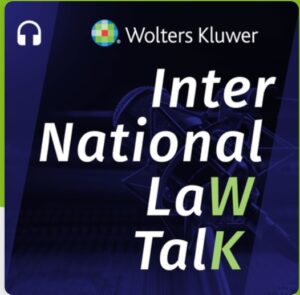Welcome to the second tax post in the series of International Law Talk. During a series of podcasts, Wolters Kluwer will bring you the latest news and industry insights from thought leaders and experts in the field of International Arbitration, IP Law, International Tax Law and Competition Law. Here at Kluwer Tax Blog, we will highlight the podcasts focused on international tax.
In the second tax podcast of the series, Professor Vikram Chand, Managing editor of Kluwer Tax Blog, interviews Bob Stack, who is a Deloitte Tax LLP managing director in Deloitte’s Washington national tax/international tax services group.

The Pillar II issue is well known by now. The proposal put forward by the OECD, among other points, seeks to establish a minimum global effective corporate tax rate. In other words, when a company which belongs to an MNE operates in a country and its effective tax rate (ETR) is below the globally agreed minimum rate then a complex set of rules will kick in and reallocate income to other jurisdictions. The re-allocations will apply pursuant to the income inclusion rule (IIR) or / and the undertaxed payments rule (UTPR). Thereafter, the jurisdiction to which the re-allocation is made can tax the income on the difference between the globally agreed rate and the actual ETR.
In this podcast, the following topics are covered:
- Where is corporate income taxed under the current international tax framework?
- What issues arise when corporate income is taxed in a State where an enterprise has its production factors ?
- The shift from restricting harmful tax competition to restricting genuine tax competition
- The scope of Pillar II – Is it more principled than Pillar I?
- The key issues with respect to determining effective tax rates
- The US GILTI and the IIR
- The under-taxed payments rule – Is it justified? Comparison with the US BEAT and Anti Hybrid Rules
- US GILTI (global blending) vs IIR (jurisdictional blending): What trumps what?
Our previous blogs on the topic can be found here:
Please click on the link below to hear our podcast:
________________________
To make sure you do not miss out on regular updates from the Kluwer International Tax Blog, please subscribe here.


